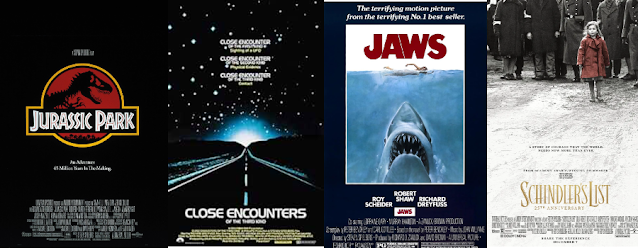Hi everyone, today I would like to talk to you about others 3 great directors.
Alice
Guy-Blaché
Born in Saint-Mandé, France, in 1873, in 1896 at just 23
years old, she directed her first film, "La Fée aux choux" thus
becoming the first female director to direct the first narrative film in
history.
Among the most famous films we find:
●
Leçon de danse (1897): a comic short film
●
Esmeralda (1905) based on the novel
"The Hunchback of Notre Dame"
●
Sappho et Pharaon (1908): a historical
film based on Greek mythology.
●
The Mysterious Ray (1913)
Steven Spielberg was born in 1946 in Ohio. He is one of the most famous and influential directors, producers and screenwriters in the history of cinema. From a young age he had a great passion for cinema and made his first short films.
Among the most important films he directed we find:
●
Jaws (1975): is a thriller about great
white shark attacks in a small coastal town.
●
Close Encounters of the Third Kind
(1977): is a science fiction film about human contact with extraterrestrial
entities.
●
Raiders of the Lost Ark (1981): is the
first film in the Indiana Jones series.
●
Jurassic Park (1993): is a science
fiction adventure about dinosaurs with which he revolutionized special effects
techniques.
●
Schindler's List (1993): is a historical
drama about the Shoah, which won seven Oscars, including the award for best
director.
● Minority Report (2002): is a science fiction thriller based on a short story by Philip K. Dick.
Spielberg co-founded the animation studio DreamWorks,
which produced groundbreaking animated films such as "Shrek" and
"Kung Fu Panda."
●
Spielberg won his first Oscar for
directing only in 1994 with "Schindler's List", after which he won
two more. He won 11 golden globes and 1 golden lion for lifetime achievement.
●
He is one of the highest-grossing
directors.
● At 12 he started creating his own short films and at 16 his first short film was broadcast.
Stanley Kubrick
Stanley Kubrick was born in 1928, is one of the most
celebrated and influential directors in the history of cinema. Kubrick
developed a passion for photography and cinema from a young age.
●
Spartacus (1960)
●
2001: A Space Odyssey (1968)
●
Clockwork Orange (1971)
●
Dr. Strangelove (1964): is a biting
satire on nuclear war
● The Shining (1980): is a psychological horror film based on the novel by Stephen King
Kubrick was known for his obsessive pursuit of perfection
and his attention to detail.Kubrick was a pioneer in the use of the Steadicam
and other camera techniques to create visual effects. Use plays of light and
colours.
Kubrick's films deal with profound and universal themes,
such as war, violence, free will and human existence.
Kubrick was known for his non-linear narrative and his use
of classical music.
Despite his extraordinary career, Kubrick won only 1 Oscar and received numerous nominations for Golden Globes, but received none.
Hello, I am Valerio Carpentieri, I am 16 years old and I
‘m in the 3rd year of Liceo Scientifico. My hobbies are travelling and watching
TV series. I’m here to write about my interests and share them with all of you.





Comments
Post a Comment